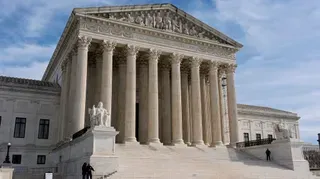February 11, 2010
Presbyterians Split on Gay Clergy
Kilian Melloy READ TIME: 3 MIN.
The Presbyterian Church USA's statement of faith says God through Jesus Christ delivers followers "from death to life eternal."
But one in three members of the nation's largest Presbyterian denomination seem to believe there's some wiggle room for non-Christians to get into heaven, according to a recent poll.
The Presbyterian Panel's "Religious and Demographic Profile of Presbyterians" found that 36 percent of members disagreed or strongly disagreed with the statement: "Only followers of Jesus Christ can be saved." Another 39 percent, or about two-fifths, agreed or strongly agreed with the statement.
"There seems to be some universalist streak in Presbyterianism, where some Presbyterians are open to the idea of other paths that folks in other faiths might be taking," said Perry Chang, administrator of the Presbyterian Panel, which convenes every three years.
The Presbyterian Church USA, with about 2.1 million members, is the largest Presbyterian denomination in the country. A total of 3,450 Presbyterians responded to the study, which was mailed in October 2008. The panel issued the religious and demographic report last month.
Polls asking similar questions about views on salvation have provided a wide range of results.
A 2005 national survey funded by Baylor University found that 53 percent of the 1,721 adults who were polled agreed with the statement, "Many religions lead to salvation," and another 19 percent said "My religion is the one true faith that leads to salvation."
A 2007 poll by the Pew Forum on Religion and Public Life found that 70 percent of Americans with a religious affiliation believe many religions can lead to eternal life.
Another study found that evangelical Christians may adhere to a much stricter interpretation of salvation. The 2008 report by Lifeway, the publishing and research arm of the Southern Baptist Convention, found that 75 percent of Protestants who hold "evangelical beliefs" strongly disagreed with the statement, "If a person is sincerely seeking God, he or she can obtain eternal life through religions other than Christianity."
The Rev. Dirk Ficca, a Presbyterian minister in Chicago, said a majority of Presbyterians feel that "the God they know in Jesus" can bring salvation to non-Christians.
"I'm a Christian. And so I can't think about God or about the nature of salvation apart from Jesus of Nazareth," said Ficca, executive director of the Chicago-based Council for a Parliament of the World's Religions. But "that God I know in Jesus, I find at work in people who aren't Christians."
" ... Some other traditions would say, 'No, God is only at work in us,'" said Ficca, who was not a part of the Presbyterian Panel's study. "And that is a big divide in the Christian community."
Chang said the panel has been asked the salvation question in the exact same way since 1996. He said in that time, there's been virtually no change in the way Presbyterians have responded.
The study broke down responses in four categories: members, elders, pastors and specialized clergy. The panel found that 45 percent of elders agree or strongly agree that "only followers of Jesus Christ can be saved," while 31 percent disagreed or strongly disagreed. More pastors disagreed (45 percent) than agreed (35 percent) and a majority of specialized clergy (60 percent) disagree.
Evangelicals and Pentecostals are more likely to claim they have had a "personal experience with a divine kind of healing" than Presbyterians, which may help explain the Presbyterian church's divide on beliefs about salvation, said Candy Gunther Brown, a religious studies professor at Indiana University in Bloomington.
"They don't generally tend to expect in Presbyterian churches that there's going to be a miraculous response to that prayer," Brown said. "And I think that does get related to theological questions about salvation."
Questionnaires were mailed in the Presbyterian study and recipients could choose not to respond. The report says 59 percent of members and 79 percent of elders responded. Response figures for pastors and specialized clergy were not available separately, but the study said together, ministers had a response rate of 70 percent.
It also asked a key question about the ordination of openly gay ministers. Last year, the denomination's presbyteries rejected an effort to undo a 1996 policy requiring gay clergy to be chaste.
When asked if the church should allow sexually active homosexuals to be ordained as ministers, 53 percent of members and 60 percent of elders responded, "no, probably not," or "no, definitely not." More pastors opposed the ordination of gays as ministers than supported it, 48 percent to 44 percent, while 64 percent of specialized clergy supported it.
Kilian Melloy serves as EDGE Media Network's Associate Arts Editor and Staff Contributor. His professional memberships include the National Lesbian & Gay Journalists Association, the Boston Online Film Critics Association, The Gay and Lesbian Entertainment Critics Association, and the Boston Theater Critics Association's Elliot Norton Awards Committee.






